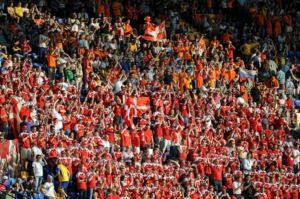News
How the fuse of Danish Dynamite was lit 50 years ago
This article is more than 4 years old.
Denmark was dreadful up until 1971 when the national football association finally agreed to let professionals playing abroad back into the team

It wasn’t always fun for the fans (photo: Dmitriy Neymyrok)
It’s good times for Danish football at the moment.
In a month’s time, Denmark takes part in the postponed Euro 2020 tournament and there is optimism of a good run, given that the Danes are ranked in the top 10 in the world.
However, it wasn’t always a walk in the Parken.
In 1948 the Danish football team won bronze at the Olympics in London, but shortly after eight out of its 13 players got offered a contract by a foreign club –which meant that the team could not go for gold at the 1952 edition.
At the time, the DBU football association stipulated that Danish footballers with a professional contract at a foreign club were banned for life from playing for the Danish national team.
Those who returned to Denmark were even forced to sit out for two years before being able to play in the Danish league again.
READ ALSO: Skinning the mighty bear: The game that united a nation
Best players in Europe, but no victories
This rule resulted in some really meagre years for the national team.
While Denmark had some of the best players in Europe, they were all playing for foreign clubs. In 1954, there were 11 Danes playing for top teams in Italy, but in the same year the national team didn’t win a single game.
Still, there was no talk of changing the rules and get Danish players abroad back on the team.
Finally in 1970, following a nine-game losing streak and the team being dubbed the ‘worst ever’, the DBU finally decided to open up for foreign professionals on the national team from 1971 onwards.
DBU sent invitations to 22 of the 70 Danish players abroad to ask if they were interested in playing for the national team again. They would get 250 kroner per international match – just like the Danish amateurs.
But initially it was difficult to get the professionals back in, because they didn’t want to play for peanuts.
Professionals in the team, but still amateurish
The first game with the new national team in Porto was amateurish, even though the professionals were involved.
They didn’t train together before the match. It was only in the locker room a few minutes before the start of the match that player Benny Nielsen discovered he had brought two right boots with him.
The debut of the new team resulted in a 0-5 loss.
For the first few years, the team didn’t improve much and they continued to fail in qualification for major tournaments.
Money and a German
However, the breakthrough came in 1978 when brewery giant Carlsberg provided the DBU with a million-kroner sponsorship on the condition that professional standards were set.
A year later, the no-nonsense German coach Sepp Piontek was hired to drive home to the players that they needed to think and work in a more professional manner.
Three years later, Denmark found itself a penalty shootout away from reaching the Euro 1982 final and the magical Danish Dynamite era kicked off in earnest.
The rest is history.










































